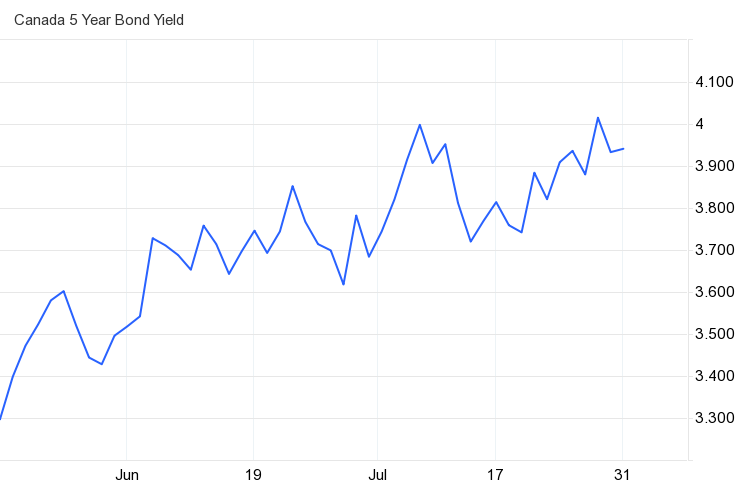How Do Bond Yields Affect Mortgage Rates in Canada?
Last Updated: August 2, 2023
What is a bond yield?
A bond creates value over its lifetime until it matures, and the yield is a measure of how much value the bond creates. Government bonds help the government pay for its operations and pay off its debt. It is also known as a ‘security’ which means the buyer is lending the government money, and is guaranteed they will be paid back the face value of the bond when it matures. In Canada, bonds are considered to be very secure investments. The buyer also receives interest payments on their loans to the government for the duration of the bond’s term.
Yield is a bond’s return and is calculated as a coupon yield or a yield to maturity (YTM). A coupon yield is a set percentage of the bond’s face value paid at regular intervals such as 15% a year. If you bought a bond for $1,000 with a 15% coupon, you would be paid $150 every year until that bond matures. A bond’s YTM is the sum of all the interest payments you would receive throughout the term of the bond. This also includes any gains or losses depending on if you bought the bond at a discount or a premium.
If you decide to sell a bond, the price you paid for it initially might have changed. If you bought a bond at face value for $1,000 and is worth $500 when you sell, it would be considered selling at a discount. If the bond has increased to $1,500, this would be considered selling at a premium. Regardless of the price of the bond when selling, the coupon percentage remains the same. The seller would still receive $150 a year based on the original value of the bond.
What determines bond yield prices?
The Government of Canada 5 year Bond Yield factors in all known economic data very frequently. When the market and bond traders believe that the Central Bank of Canada will increase rates, the Bond Yield increases and vice versa. In other words, the Bond yield is priced in anticipation of where the Central Bank of Canada rates will move. The Central Bank of Canada makes its rate decisions, based on the status of the economy. Currently for the Canada 5-Year Bond Yield, Canadian bonds are priced in anticipation of a further 0.75% increase in Central Bank of Canada rates in early 2023.
How are bond yields related to mortgage rates?
Bonds and mortgages are both types of loans with set terms. When you buy a bond, you lend money to a company or government, and they pay you back with interest after a specific time. Banks like bonds because they offer a predictable return and are safer.
On the other hand, mortgages are loans for buying houses, and banks earn money through interest. Mortgages are riskier than bonds because borrowers might not repay the loan. Due to this risk, banks charge higher interest rates on mortgages than on bonds.
When bond yields increase, banks find mortgages less attractive to invest in. They raise mortgage rates to compensate for the increased risk, making it more expensive to get a mortgage when bond yields rise.
Bond yields have a greater impact on fixed-rate mortgages. Mortgage lenders will set their fixed mortgage rates to bond rates, so when bond yields rise so do fixed mortgage rates and vice versa. Variable mortgage rates are not impacted the same way. Variable rates are tied to the prime rate, which is influenced by monetary policy decisions made by central bankers.
How will bond yields affect my mortgage rate in 2023?
Bond yields are on the rise as of July 2023, which could keep upward pressure on fixed mortgage rates if the trend continues. Bond yields, which typically lead fixed mortgage rate pricing, have surged over 20 basis points. The 5-year Government of Canada bond yield rose to 3.92%, on its way back up to the next resistance level of 4%. If the yields go above the 4%, it could lead to increases for fixed mortgage rates.

